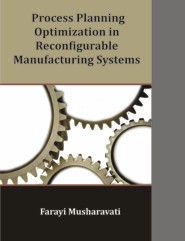LibraryPhysical Science & MathEngineering
Process Planning Optimization in Reconfigurable Manufacturing Systems
| Institution: | University Putra Malaysia |
|---|---|
| Advisor(s): | Dr. Napsiah Ismail, Professor A.S.M. Hamouda, and Dr. Raman Ramli |
| Degree: | Ph.D. in Manufacturing Systems Engineering |
| Year: | 2008 |
| Volume: | 198 pages |
| ISBN-10: | 1599423596 |
| ISBN-13: | 9781599423593 |
Abstract
Trends and perspectives in dynamic environments point towards a need for optimal operating levels in reconfigurable manufacturing activities. Central to the goal of meeting this need is the issue of appropriate techniques for manufacturing process planning optimization in reconfigurable manufacturing, i.e. (i) what decision making models and (ii) what computational techniques, provide an optimal manufacturing process planning solution in a multidimensional decision variables space? Conventional optimization techniques are not robust, hence; they are not suitable for handling multidimensional search spaces. On the other hand, process planning optimization for reconfigurable manufacturing is not amenable to classical modeling approaches due to the presence of complex system dynamics. Therefore, this study explores how to model reconfigurable manufacturing activities in an optimization perspective and how to develop and select appropriate non-conventional optimization techniques for reconfigurable process planning.
In this study, a new approach to modeling Manufacturing Process Planning Optimization (MPPO) was developed by extending the concept of manufacturing optimization through a decoupled optimization method. The uniqueness of this approach lies in embedding an integrated scheduling function into a partially integrated process planning function in order to exploit the strategic potentials of flexibility and reconfigurability in manufacturing systems. Alternative MPPO models were constructed and variances associated with their utilization analyzed. Five (5) Alternative Algorithm Design Techniques (AADTs) were developed and investigated for suitability in providing process planning solutions suitable for reconfigurable manufacturing. The five (5) AADTs include; a variant of the simulated annealing algorithm that implements heuristic knowledge at critical decision points, two (2) cooperative search schemes based on a “loose hybridization” of the Boltzmann Machine algorithm with (i) simulated annealing, and (ii) genetic algorithm search techniques, and two (2) modified genetic algorithms.
The comparative performances of the developed AADTs when tasked to solve an instance of a MPPO problem were analyzed and evaluated. In particular, the relative performances of the novel variant of simulated annealing in comparison to: (a) (i) a simulated annealing search, and (ii) a genetic search in the Boltzmann Machine Architecture, and (b) (i) a modified genetic algorithm and (ii) a genetic algorithm with a customized threshold operator that implements an innovative extension of the diversity control mechanism to gene and genome levels; were pursued in this thesis.
Results show that all five (5) AADTs are capable of stable and asymptotic convergence to near optimal solutions in real time. Analysis indicates that the performances of the implemented variant of simulated annealing are comparable to those of other optimization techniques developed in this thesis. However, a computational study shows that; in comparison to the simulated annealing technique, significant improvements in optimization control performance and quality of computed solutions can be realized through implementing intelligent techniques. As evidenced by the relative performances of the implemented cooperative schemes, a genetic search is better than a simulated annealing search in the Boltzmann Machine Architecture. In addition, little performance gain can be realized through parallelism in the Boltzmann Machine Architecture. On the other hand, the superior performance of the genetic algorithm that implements an extended diversity control mechanism demonstrates that more competent genetic algorithms can be designed through customized operators.
Therefore, this study has revealed that extending manufacturing optimization concepts through a de-coupled optimization method is an effective modeling approach that is capable of handling complex decision scenarios in reconfigurable manufacturing activities. The approach provides a powerful decision framework for process planning optimization activities of a multidimensional nature. Such an approach can be implemented more efficiently through intelligent techniques. Hence; intelligent techniques can be utilized in manufacturing process planning optimization strategies that aim to improve operating levels in reconfigurable manufacturing with the resultant benefits of improved performance levels.
About The Author
Currently, Farayi Musharavati is an Assistant Professor at Qatar University, Department of Mechanical and Industrial Engineering in the State of Qatar. He obtained a Ph.D. in Manufacturing Systems Engineering from University Putra Malaysia. He holds a BTech. (Honors) Degree in Mechanical and Production Engineering, an MSc. in Renewable Energy, and another MSc. in Manufacturing Systems and Operations Management, all from the University of Zimbabwe. He has had four (4) years experience as an Engineer, and three (3) years teaching experience at university level prior to doctoral studies. His Primary research interests include: Reconfigurable Manufacturing Systems, Reconfigurable Process Planning and Scheduling, Manufacturing Optimization, Intelligent Manufacturing, Advanced Manufacturing Technologies and Systems, and Applications of Artificial Intelligence in Manufacturing. Secondary research interests include: Renewable Energy Technologies and Systems, Oil and Gas Processing, Applications of Lean and Six Sigma Techniques, Healthcare Systems and Operations Management, and Industrial Ecology and Ecosystems. His teaching interests include: Manufacturing Systems Design, Systems Engineering, Industrial Systems Design, Manufacturing Technologies, Systems Simulation, Manufacturing Processes, Facilities Planning and Design, Maintenance Engineering and Management, Expert Systems, and Engineering Management.

